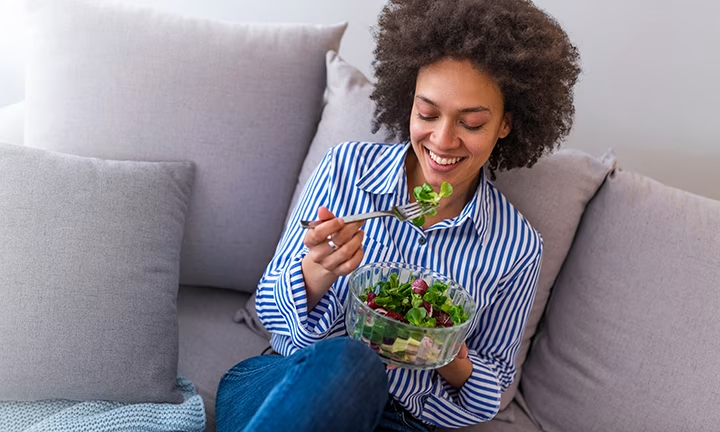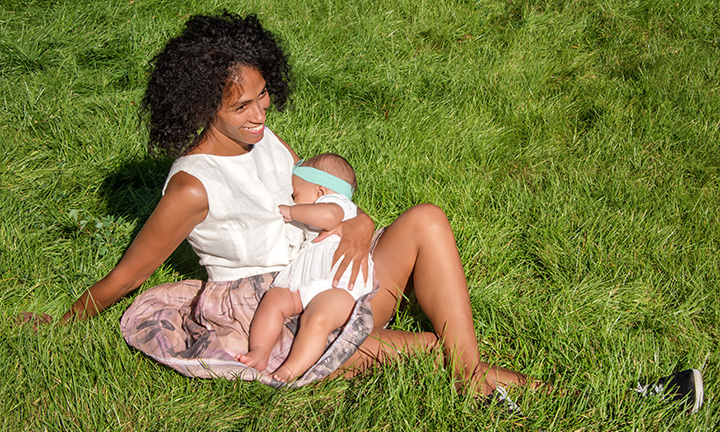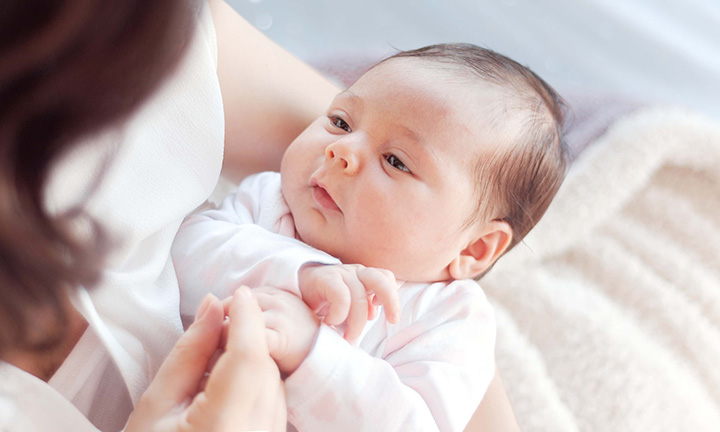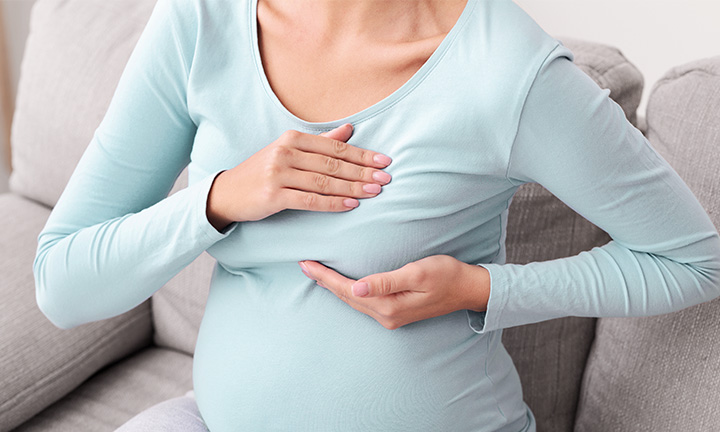
A Healthy Breastfeeding Diet
Wondering what are the best foods to eat and what foods to avoid while breastfeeding your little one? You’ve come to the right place! Discover what to eat and what not eat when breastfeeding so that both you and your baby stay healthy and get the best possible nutrition.
Do You Need to Follow a Special Breastfeeding Diet?
There’s no strict diet or meal plan that you need to follow to the letter when you’re breastfeeding. Instead, it’s best to aim for a balanced, healthy diet to help maintain your breast milk supply and support your and your baby’s nutritional needs. The good news is that most of the foods you’re advised to avoid during pregnancy, like pâté, soft cheeses or Parma ham, are no longer out of bounds.
However, there are a still a few types of food and drinks that it’s best to avoid or limit when breastfeeding, but overall there are far fewer restrictions compared to when you were pregnant.
What to Eat When Breastfeeding
So, what does a healthy breastfeeding diet look like? Well, just like any other time in your life, its important to enjoy a diet that includes a healthy mix of

Calcium-Rich Foods
One of the most important dietary minerals is calcium, which helps keep bones healthy and strong. As a breastfeeding mum, you'll need to make sure you get your recommended daily dose of 1250 milligrams – either via the food you eat or with the help of supplements. Dairy is a great source of calcium as part of a balanced diet. Here are some examples to give you an idea of how much calcium is found in some common dairy-based products:
How Much Calcium Is in Dairy Products?
Of course, not everyone can (or wants to) eat dairy. Having a vegan lifestyle or being lactose intolerant is no barrier to eating a healthy breastfeeding diet – you just need to make sure you’re getting the calcium you need from other sources. Some non-dairy foods that are good sources of calcium include:
Talk to your health visitor or doctor if – for whatever reason – you think you may be falling short of the 1250 milligrams per day recommendation. If necessary, your doctor may recommend taking a calcium supplement.
Vitamin D
Vitamin D, along with calcium, is crucial for building and maintaining strong, healthy bones – especially when you’re breastfeeding. It helps regulate the amount of calcium and other minerals in your body.
Exposure to sunlight is the main source of vitamin D, but our climate – and a mainly indoor lifestyle – means that many people in the UK don’t catch enough sun to activate all the vitamin D they need, especially in winter.
This is why taking a vitamin D supplement of 10 micrograms (or 400 international units) is recommended during pregnancy and breastfeeding.
If you’re breastfeeding, experts advise giving your baby a vitamin D supplement in the first year after birth.
This is because babies who are exclusively breastfed are at risk of developing a condition called rickets (which can result in curved bones) if they don’t get enough vitamin D from breast milk alone. (Formula-fed babies who drink at least 500 millilitres of formula a day probably get enough because infant formula is already supplemented with vitamin D.)
It’s also recommended that your child continue taking a vitamin D supplement after you stop breastfeeding or formula feeding, up to the age of 4 years.
Talk to your health visitor or doctor about vitamin D supplements for you and your little one.
Although it’s difficult to get all the vitamin D you and your baby need from your diet alone, some foods do contain this naturally, including:

Water
You may notice that you are thirstier than usual while you’re lactating. It’s important to make sure you’re drinking enough water every day. A good tip is to keep a glass of water, or skimmed or semi-skimmed milk, close at hand every time you breastfeed to ensure you’re staying well hydrated.
Foods to Avoid or Limit While Breastfeeding
After carefully watching what you were eating during your pregnancy, lots of foods that you’d started to miss might be back on the menu again – but there are still some foods and drinks to be wary of when breastfeeding.
Below are some of the foods and drinks to avoid or limit while breastfeeding.
Seafood That’s High in Mercury
Fish and shellfish can play an important role in a healthy diet, since they’re packed full of vitamins and minerals, and rich in protein and omega-3 fatty acids. However, some types of fish contain high levels of mercury, which can cause damage to the nervous system in babies and small children. For this reason, it’s best to avoid fish such as shark, swordfish and marlin while you’re breastfeeding, or limit your consumption to one portion a week. It’s also advised to eat a maximum of two portions of oily fish a week. Oily fish include:
There are plenty of fish that you eat as much of as you like though. There’s no limit on how much tinned (not fresh) tuna you can eat, for example. White and non-oily fish are also fine, so you don’t need to hold back when it comes to eating
Alcohol and Breastfeeding
It’s safest not to drink any alcohol at all while breastfeeding, but the occasional drink – one or two units of alcohol every week or two – is unlikely to harm your baby. To keep health risks low, experts advise drinking no more than 14 units of alcohol in a week (spread evenly over several days, not all at once) when breastfeeding. One unit of alcohol is roughly equivalent to
After you drink a glass of wine or beer it takes two to three hours for the alcohol to leave your system, and once it does your breast milk will also be alcohol-free. Keep in mind, however, that the more you drink the longer you’ll have to wait for your breast milk to return to normal. If you know you’re going to be drinking socially, you might want to express and store a little breast milk beforehand, so your baby doesn’t have to miss a feed. If you regularly drink larger quantities of alcohol and feel you need help cutting down, the free national alcohol helpline (0300 123 1110) can give you confidential advice. Your midwife, health visitor or doctor can also point you in the direction of local support groups. Never share a bed with your baby after drinking any amount of alcohol. This can increase the risk of sudden infant death syndrome (SIDS).
Caffeine and Breastfeeding
Caffeine can be passed on to your baby in breast milk. It’s a stimulant, so drinking too much of it can make your little one fussy or irritable and keep him or her awake. Substituting coffee and tea for decaffeinated alternatives can help cut down on your caffeine intake while you’re breastfeeding; but if you don’t want to go completely decaf, it’s recommended to try limiting your consumption to 300 milligrams or less of caffeine a day. In case you’re wondering what 300 milligrams of caffeine looks like, as a rough guide it’s around two mugs of filter coffee (140 milligrams per cup), or three cups of instant (around 100 milligrams each). Keep in mind that coffee and tea aren’t the only things with caffeine in them. Some fizzy drinks, energy drinks, chocolate and even flu remedies can also contain it, so factor all these into your calculations of how much caffeine is included in your breastfeeding diet. If consuming these kinds of foods and drinks always check the packaging for how much caffeine is in them first.
Sugary and Fatty Foods and Drinks
Try to limit or avoid sugary drinks, including soft drinks like fruit juices and iced teas. Instead, drink lots of water. Luckily there are plenty of healthy snacks you can eat between meals if you need an extra boost of energy while you’re breastfeeding. Here are just a few healthy snack ideas, which are perfect if you’re a breastfeeding mum:
Medicines
Some medicines can affect your baby if you take them while breastfeeding, so always check with your doctor or pharmacist before taking any medication. You may also want to check if any medicines that you already take could be passed on through breast milk. It’s usually possible to find a safe alternative.
Intolerances and Allergies: Can Your Baby Have an Adverse Reaction?
Contrary to what you might have heard, just because you’re breastfeeding you don’t necessarily have to avoid foods that are known to trigger reactions – such as peanuts – unless you’re allergic to them yourself, of course. Traces of what you eat can be passed on to your baby in breast milk, however, so if your little one is sensitive to something you eat, you may need to avoid that food while you’re breastfeeding. If you like spicy food, it’s usually fine to keep on eating it while breastfeeding. In fact, you might be broadening your little one’s horizons by exposing him or her to new flavours even at this early age! It isn’t always easy to tell whether something in your diet disagrees with your baby or whether something else – like reflux or gastro-oesophageal reflux disease (GORD) – is making your little one fussy – talk to your health visitor or doctor if you have any concerns.
Cow’s Milk Allergy and Lactose Intolerance
One of the most common food allergies in young babies is cow’s milk allergy (CMA). This is more likely to affect a child being fed with first infant formula, but sometimes breastfed babies can have a reaction to cow’s milk protein in breast milk. Symptoms of CMA (or some other food allergy) may include:
A reaction to cow’s milk (passed on during breastfeeding) isn’t always an allergy. Some babies are lactose intolerant, which just means they have trouble digesting lactose (the natural sugar found in milk). This isn’t the same as an allergy, and the good news is that it may only be temporary. Symptoms of this can include diarrhoea, vomiting, tummy pain or wind. Tell your doctor if your baby seems unwell after feeding and your think it might be due to an allergy or intolerance. Seek medical attention immediately if your baby has trouble breathing or you notice any swelling of the face or throat.
FREQUENTLY ASKED QUESTIONS
While you’re breastfeeding, you should
- stay away from seafood high in mercury
- try to avoid or limit alcohol
- limit the consumption of caffeinated beverages like coffee, tea and other caffeinated foods and drinks.
In a Nutshell
Keeping your diet as healthy, varied, and well-rounded as possible while breastfeeding helps give your baby a great start in life, and it also helps you take good care of yourself. Bon appétit!
- NHS: Breastfeeding and diet
- NHS: Top Breastfeeding Tips
- NHS: Vegetarian and vegan mums-to-be
- NHS: A Healthy Diet For You and Your Baby
- NHS: Eat well
- NHS: Calcium
- NHS: Dietary Advice for Breastfeeding Mums with Babies who have a Cow’s Milk Protein Allergy
- NHS: Vitamin – D
- NHS: Vitamin D In pregnancy, breastfeeding and children under 5
- NHS: Fish and shellfish
- NHS: Healthy breastfeeding diet
- NHS: Should pregnant and breastfeeding women avoid some types of fish?
- NHS: Alcohol and breastfeeding
- NHS: Breastfeeding and drinking alcohol
- NHS: Lifestyle and breastfeeding
- NHS: Food allergies in babies and young children
Read more about Newborn Baby
Join Pampers Club and get:














